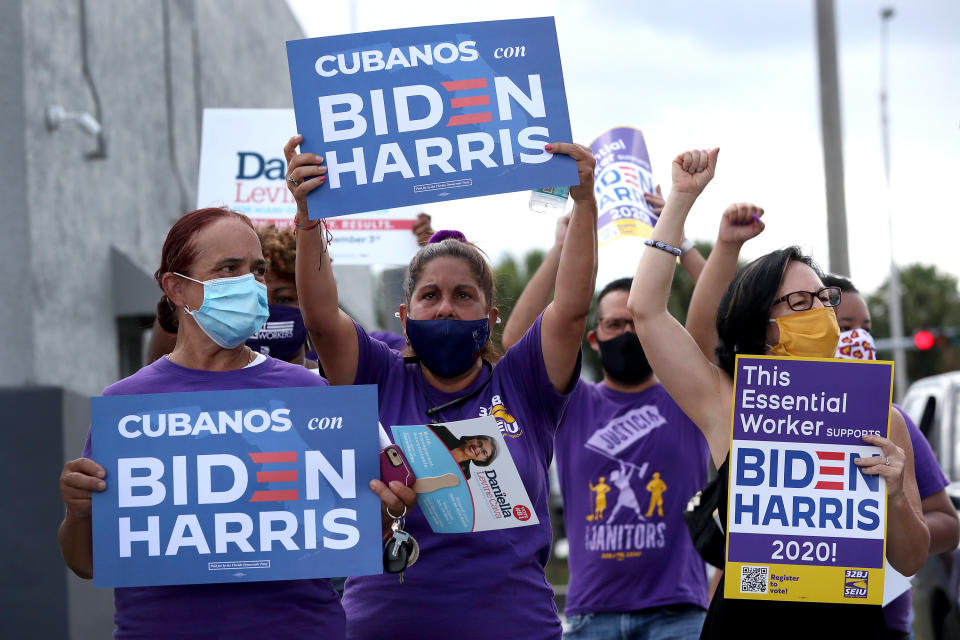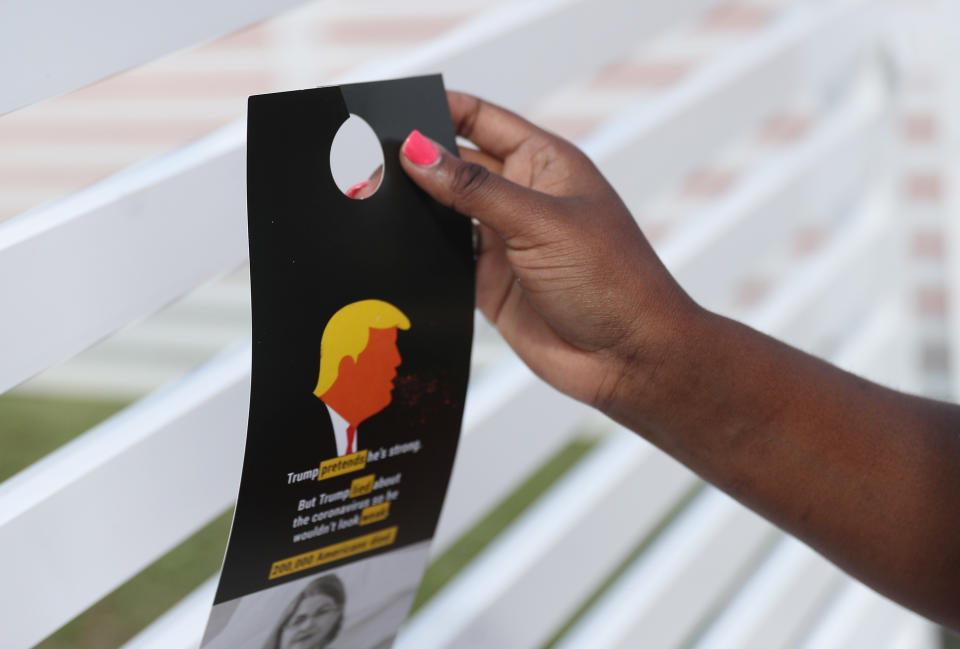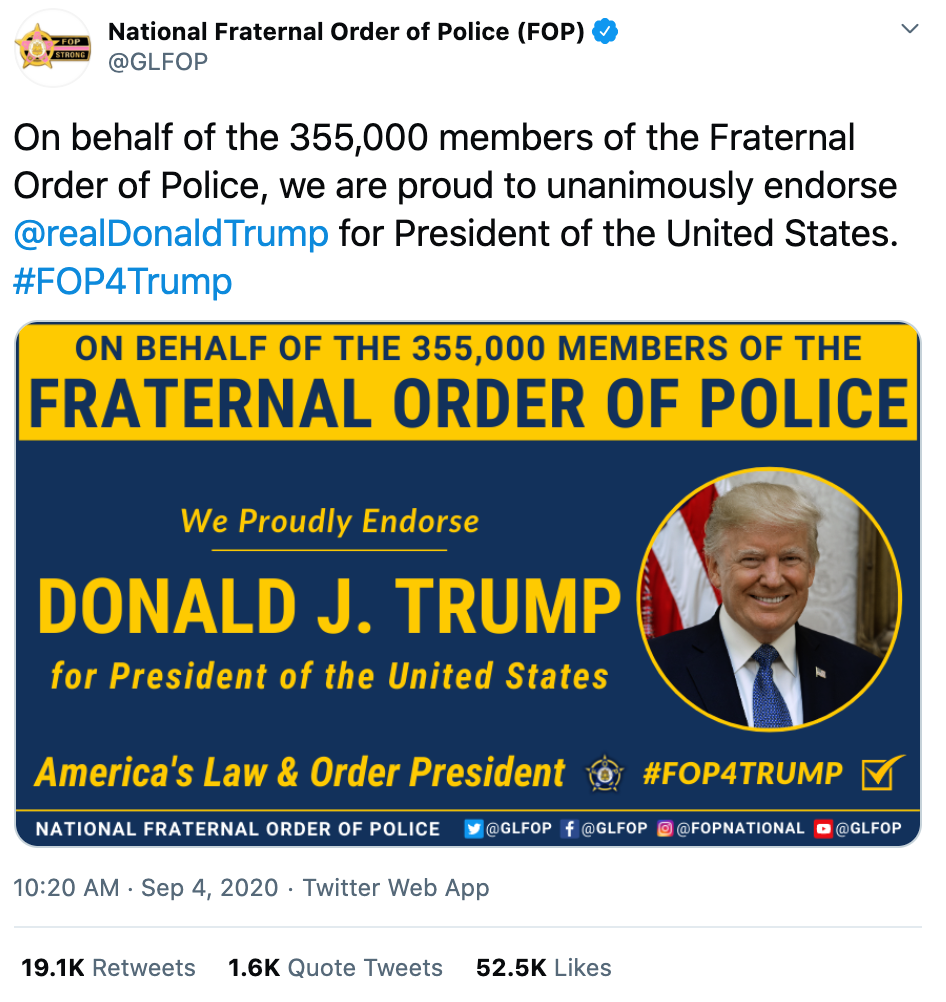'The majority will vote for Biden': Florida's unions throw support behind ex-VP
Seasoned pollsters who locked in a Hillary Clinton victory before the last presidential election have rejiggered their analyses to better inform their 2020 forecasts — including how voters in swing states will lean in November.
Layered into those analyses are efforts to suss out how workers in battleground states view their prospects for future employment under a Donald Trump versus Joe Biden presidency, especially as the novel coronavirus pandemic weighs on American jobs.
Perhaps the most important battleground is Florida, where a victory translates to taking 29 electoral votes that Trump captured in 2016 by fewer than 113,000 votes. In that key swing state, as past national voting patterns would predict, Biden has significant union backing. However, Clinton’s narrower than expected 51% share of the national union household vote in 2016 makes securing members’ votes essential.
‘I’m sure the majority will go for Biden’
Several labor union representatives from industries that employ the bulk of the state’s civilian workers — trade and transportation, leisure and hospitality, food service, and healthcare — say their members are more likely to support Biden than Trump.
“I’m sure the majority will go for Biden,” Ed Chambers, president of United Food & Commercial Workers (UFCW), said, of that union’s members.
While Chambers said that a minority of union members who earn higher wages are expected to vote for Trump, union members who earn less will vote for Biden.
“The lower the wage earner, the more likely they are going to be to represent Biden,” he said of the particular union’s members.

In 2016, union members, including those in Florida, failed to turn out to back Hillary Clinton despite get-out-the-vote efforts, as Politico reported. That could change in 2020, though. Robert Bruno, a professor of labor and employment relations at University of Illinois, said while Florida has relatively low union membership, he expects November’s labor vote for Trump to be lower than 2016.
“I think the union vote and the union household vote will be closer to the historical norms than to the aberration in 2016, meaning that we’ll see a larger differential in union members voting Democratic,” Bruno said.
As of 2019, approximately 551,000 of Florida’s 8.83 million wage and salary workers were union members. Of note, Bruno said, are changes in the state’s union density, or percentage of workers who belong to a union. During Trump’s administration, union density in Florida increased from 5.6% to 6.2%.
While Biden may have more union backing in Florida and nationally, Trump has support from the state’s largest law enforcement union, Florida Police Benevolent Association, as well as the nation’s largest law enforcement union, the Fraternal Order of Police.
An economy driven by hard-hit industries
The Sunshine State boasts the 4th largest economy in the U.S., driven by the hard-hit leisure and hospitality industries more than many other states.
Since pandemic shutdowns began in the U.S. in late March, the most vulnerable jobs in Florida, and across the country, have included leisure and hospitality, food service, retail, travel and transportation services, and motion picture positions.
As of April, Florida’s leisure and hospitality jobs had declined 42% year over year. The industry pared losses in August, to 20% year over year. Florida’s accommodation and food service jobs as of April had declined 44% from April last year. As of August, the number of positions improved with employment down 20% compared to the prior year.

Still, Florida’s leisure and hospitality industry continued to suffer in September. Disney World, the country’s largest single-site employer with about 75,000 Florida workers, and as many as 80,000 during peak seasons, announced in September it would lay off 28,000 workers between its Florida and California theme parks and cruise lines. That came after furloughs for about 100,000 Disney workers earlier in the year.
Healthcare and transportation fared better in the state, with job losses for healthcare recovering from year over year losses in April of 7% to year over year losses of 1% in August. Combined transportation, warehousing and utility employment was down 3% in April compared to last year, and narrowed losses to about 1% in August.
‘A politicalization of the regulatory agencies’
While the healthcare industry may not have suffered as much as other sectors, the pandemic could still influence how its workers vote.
Healthcare workers’ distrust of the Trump administration’s handling of the coronavirus is likely to spur them to vote for Biden, according to Dale Ewart, president of United Healthcare Workers East local 1199, the largest multi-state local healthcare workers union in the country. Bruno, the professor, backed up this conclusion.
“We’ve seen a politicalization of the regulatory agencies that are supposed to protect patients and workers,” Ewart said, explaining that federal agencies tied to healthcare like the U.S. Centers for Disease Control and Prevention (CDC) are no longer seen as credible to some of the union’s workers.

The CDC, for example, quickly withdrew guidance last month indicating that COVID-19 spreads through the air. That reluctance to identify aerosol transmission “is not just an idle academic exercise,” Ewart said.
“It has real world implications for whether workers get N95 respirators when they're taking care of COVID patients, or whether they're just given a surgical mask,” he said. “That literally, for a health care worker on the front line, is a life and death decision.”
The U.S. Food and Drug Administration (FDA) and the Occupational Safety and Health Administration (OSHA) have also short-changed healthcare workers, Ewart said. He cited the FDA’s emergency use authorization to reuse or recondition respirator masks intended for single use, and OSHA’s alleged failure to promulgate workplace rules specific to COVID-19.
‘The whole system crashed’
In addition to being disillusioned with federal agencies, Florida’s workers may also be fed up with the state’s comparatively strict unemployment insurance system. While federal stimulus checks pushed through Congress under the Trump administration reached Americans below certain income levels, additional benefits tied to state unemployment benefits remained out of reach for some people who lost jobs.
A $600 weekly federal supplement to unemployment ended in July. While the federal government promised an additional $400 weekly benefit after the $600 supplement expired, it asked states to chip in $100. With many states struggling, that meant the vast majority of workers got $300 a week on top of their state unemployment.
“The whole system crashed,” Chambers said of its benefits website that failed in April, leaving out-of-work Floridians scrambling to receive any benefits.
Chambers also criticized the state’s methods for counting workers as unemployed, and its comparatively low unemployment benefit of just $275 a week.
Kimberly Holdridge, a business representative from central Florida’s Service Trades Council Union (STCU) International Alliance of Theatrical Stage Employees Local 631, blamed the Republican-controlled state legislature for what she says are unreasonable qualification criteria, and for failing to continue counting those who have exhausted their benefits as unemployed.
“There are plenty of people out there who haven’t got the first damn dime that they are rightfully due,” she said about some of her members who worked at Disney World.
Biden may have the backing of more than just disgruntled union members come Election Day, though. Among Florida’s nearly 14.1 million registered voters, 5 million are Republicans and 5.2 million are Democrats. As of Oct. 14, an updating average of 2020 general election polls from FiveThirtyEight showed Biden leading Trump by 4.1 points.
Alexis Keenan is a legal reporter for Yahoo Finance and former litigation attorney.
Follow Alexis Keenan on Twitter @alexiskweed.
Read more:
Short seller Hindenburg says Loop Industries’ recycling technology is ‘fiction’
‘Dangerous for democracy: Big tech hearing gives clues on future of antitrust law’
How Donald Trump and other real estate professionals get away with paying ‘zero tax’
Nikola could find itself in legal trouble if short seller claims are true
Labor Department proposes definition for independent contractors for the first time ever
Follow Yahoo Finance on Twitter, Facebook, Instagram, Flipboard, SmartNews, LinkedIn, YouTube, and reddit.
Find live stock market quotes and the latest business and finance news

 money
money 
